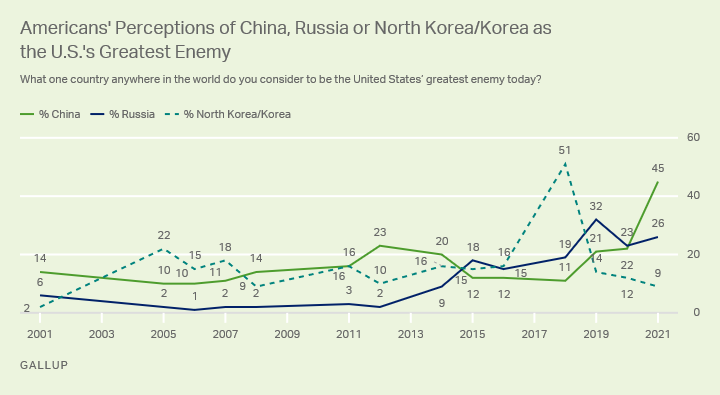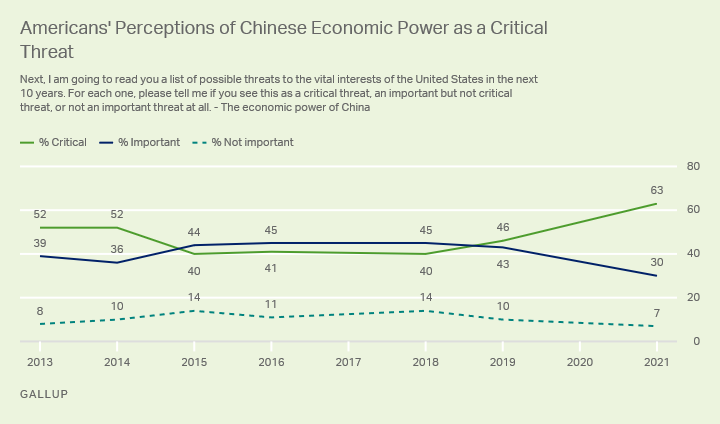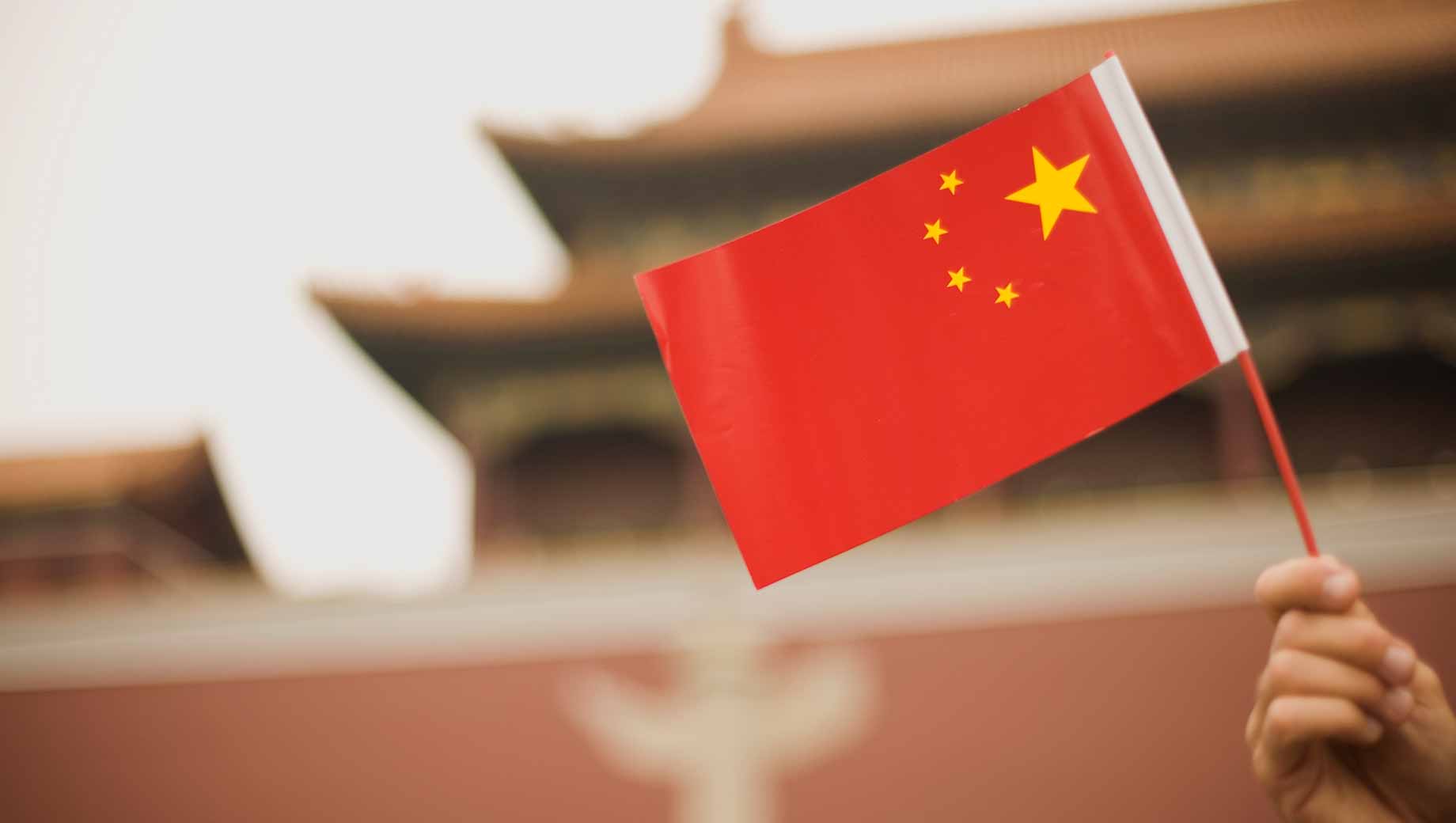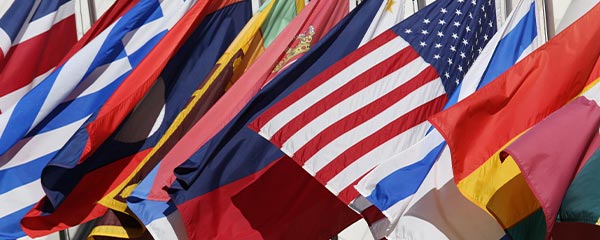Story Highlights
- China now seen as U.S.'s greatest enemy
- Half of Americans believe China is world's leading economic power
- Record 63% say economic power of China is critical threat to U.S.
WASHINGTON, D.C. -- Forty-five percent of Americans now say China is the greatest enemy of the U.S., more than double the percentage who said so in 2020. That year, Americans were equally as likely to say either China or Russia was the U.S.'s greatest enemy. The current shift coincided with a period when the global economy and human activity were severely impacted by the coronavirus pandemic, which originated in China.
| 2021 Feb 3-18 | 2020 Feb 3-16 | Change | |||||||||||||||||||||||||||||||||||||||||||||||||||||||||||||||||||||||||||||||||||||||||||||||||
|---|---|---|---|---|---|---|---|---|---|---|---|---|---|---|---|---|---|---|---|---|---|---|---|---|---|---|---|---|---|---|---|---|---|---|---|---|---|---|---|---|---|---|---|---|---|---|---|---|---|---|---|---|---|---|---|---|---|---|---|---|---|---|---|---|---|---|---|---|---|---|---|---|---|---|---|---|---|---|---|---|---|---|---|---|---|---|---|---|---|---|---|---|---|---|---|---|---|---|---|
| % | % | pct. pts. | |||||||||||||||||||||||||||||||||||||||||||||||||||||||||||||||||||||||||||||||||||||||||||||||||
| China | 45 | 22 | 23 | ||||||||||||||||||||||||||||||||||||||||||||||||||||||||||||||||||||||||||||||||||||||||||||||||
| Russia | 26 | 23 | 3 | ||||||||||||||||||||||||||||||||||||||||||||||||||||||||||||||||||||||||||||||||||||||||||||||||
| North Korea/Korea | 9 | 12 | -3 | ||||||||||||||||||||||||||||||||||||||||||||||||||||||||||||||||||||||||||||||||||||||||||||||||
| Iran | 4 | 19 | -15 | ||||||||||||||||||||||||||||||||||||||||||||||||||||||||||||||||||||||||||||||||||||||||||||||||
| Iraq | 2 | 7 | -5 | ||||||||||||||||||||||||||||||||||||||||||||||||||||||||||||||||||||||||||||||||||||||||||||||||
| Afghanistan | 1 | 1 | 0 | ||||||||||||||||||||||||||||||||||||||||||||||||||||||||||||||||||||||||||||||||||||||||||||||||
| United States itself | 1 | 1 | 0 | ||||||||||||||||||||||||||||||||||||||||||||||||||||||||||||||||||||||||||||||||||||||||||||||||
| Mexico | 1 | -- | 1 | ||||||||||||||||||||||||||||||||||||||||||||||||||||||||||||||||||||||||||||||||||||||||||||||||
| Saudi Arabia | -- | 1 | -1 | ||||||||||||||||||||||||||||||||||||||||||||||||||||||||||||||||||||||||||||||||||||||||||||||||
| Middle East (non-specific) | -- | 1 | -1 | ||||||||||||||||||||||||||||||||||||||||||||||||||||||||||||||||||||||||||||||||||||||||||||||||
| Japan | -- | 1 | -1 | ||||||||||||||||||||||||||||||||||||||||||||||||||||||||||||||||||||||||||||||||||||||||||||||||
| Israel | -- | 2 | -2 | ||||||||||||||||||||||||||||||||||||||||||||||||||||||||||||||||||||||||||||||||||||||||||||||||
| Syria | -- | 1 | -1 | ||||||||||||||||||||||||||||||||||||||||||||||||||||||||||||||||||||||||||||||||||||||||||||||||
| Pakistan | -- | 1 | -1 | ||||||||||||||||||||||||||||||||||||||||||||||||||||||||||||||||||||||||||||||||||||||||||||||||
| Gallup | |||||||||||||||||||||||||||||||||||||||||||||||||||||||||||||||||||||||||||||||||||||||||||||||||||
The Feb. 3-18 poll also finds favorable views of China among U.S. adults falling for the second straight year, putting the figure at a historically low 20%.
The rise in perceptions of China as the United States' greatest enemy is accompanied by a sharp decline since 2020 in those mentioning Iran (down 15 percentage points to 4%), as well as four-to-five-point declines in mentions of Iraq and North Korea and smaller declines in a handful of other countries.
Perceptions of Russia as the United States' greatest enemy, now 26%, were essentially unchanged from a year ago when 23% named it. But it is down from 32% who did so in 2019 when it ranked first overall. The 9% of Americans who view North Korea as their country's greatest enemy is a noticeable turn from previous years when rhetorical tensions, military escalations and missile testing were more elevated. In 2018, 51% named North Korea as the greatest enemy.
Americans' Perceptions Over Time
Over the past several years, there have been noticeable fluctuations between the country perceived as the nation's greatest adversary; China last ranked No. 1 in 2014, Russia topped the list in 2020, 2019 and 2014, and North Korea ranked highest in 2018 and 2016.
Prior to China, Russia and North Korea's top rankings, Americans named Iran (2006-2008, 2011 and 2012) and Iraq (2001 and 2005) as the United States' greatest enemy.

Line graph. Americans' perceptions that China, Russia or North Korea/Korea as the U.S. greatest enemy. Now 45% say China is the greatest enemy, 26% Russia and 9% North Korea/Korea.
While North Korea continues to hold the overall record high of 51% as the U.S.'s greatest enemy, that focus has now shifted to its ally and primary benefactor, China.
There are noticeable partisan differences in perceptions of the greatest enemy of the U.S, with Republicans naming China as the top country and Democrats citing Russia. While 76% of Republicans name China as the greatest enemy, 43% of independents and 22% of Democrats do so. Conversely, close to half of Democrats name Russia (47%) compared with one in four independents (24%) and just 6% of Republicans.
Who Is the World's Leading Economic Power?
While Americans perceive China as the country's top enemy, half also believe that China is the world's leading economic power. This perception has noticeably increased since 2020, likely because of the COVID-related decline in the U.S. economy in the past year. While China has made strong progress in its overall GDP growth, it remains the world's second-largest economy to the United States.
Since 2000, Americans have alternated between choosing China or the United States as the leading economic power, often influenced by the current health of the U.S. economy. The 50% of Americans perceiving the U.S. as the top economic power a year ago was the highest in two decades, reflecting the nation's strong economic performance just before the pandemic.
Far fewer Americans select the European Union (5%), Japan (4%), Russia (2%) or India (1%) for this distinction. Of these, only Japan has been chosen by 10% or more in Gallup's trend since 2000, with those instances occurring more than a decade ago.
| China | United States | European Union | Japan | Russia | India | ||||||||||||||||||||||||||||||||||||||||||||||||||||||||||||||||||||||||||||||||||||||||||||||
|---|---|---|---|---|---|---|---|---|---|---|---|---|---|---|---|---|---|---|---|---|---|---|---|---|---|---|---|---|---|---|---|---|---|---|---|---|---|---|---|---|---|---|---|---|---|---|---|---|---|---|---|---|---|---|---|---|---|---|---|---|---|---|---|---|---|---|---|---|---|---|---|---|---|---|---|---|---|---|---|---|---|---|---|---|---|---|---|---|---|---|---|---|---|---|---|---|---|---|---|
| % | % | % | % | % | % | ||||||||||||||||||||||||||||||||||||||||||||||||||||||||||||||||||||||||||||||||||||||||||||||
| 2021 Feb 3-18 | 50 | 37 | 5 | 4 | 2 | 1 | |||||||||||||||||||||||||||||||||||||||||||||||||||||||||||||||||||||||||||||||||||||||||||||
| 2020 Feb 3-16 | 39 | 50 | 4 | 4 | 2 | 1 | |||||||||||||||||||||||||||||||||||||||||||||||||||||||||||||||||||||||||||||||||||||||||||||
| 2018 Feb 1-10 | 44 | 42 | 5 | 4 | 2 | 1 | |||||||||||||||||||||||||||||||||||||||||||||||||||||||||||||||||||||||||||||||||||||||||||||
| 2016 Feb 3-7 | 50 | 37 | 4 | 5 | 2 | 1 | |||||||||||||||||||||||||||||||||||||||||||||||||||||||||||||||||||||||||||||||||||||||||||||
| 2014 Feb 6-9 | 52 | 31 | 5 | 7 | 2 | 2 | |||||||||||||||||||||||||||||||||||||||||||||||||||||||||||||||||||||||||||||||||||||||||||||
| 2013 Feb 7-10 | 53 | 32 | 2 | 8 | 2 | 2 | |||||||||||||||||||||||||||||||||||||||||||||||||||||||||||||||||||||||||||||||||||||||||||||
| 2012 Feb 2-5 | 53 | 33 | 3 | 7 | * | 2 | |||||||||||||||||||||||||||||||||||||||||||||||||||||||||||||||||||||||||||||||||||||||||||||
| 2011 Feb 2-5 | 52 | 32 | 3 | 7 | 2 | 1 | |||||||||||||||||||||||||||||||||||||||||||||||||||||||||||||||||||||||||||||||||||||||||||||
| 2009 Feb 9-12 | 39 | 37 | 7 | 10 | 2 | 1 | |||||||||||||||||||||||||||||||||||||||||||||||||||||||||||||||||||||||||||||||||||||||||||||
| 2008 Feb 11-14 | 40 | 33 | 7 | 13 | 2 | 2 | |||||||||||||||||||||||||||||||||||||||||||||||||||||||||||||||||||||||||||||||||||||||||||||
| 2000 May 18-21 | 10 | 65 | 4 | 16 | 2 | * | |||||||||||||||||||||||||||||||||||||||||||||||||||||||||||||||||||||||||||||||||||||||||||||
| Gallup | |||||||||||||||||||||||||||||||||||||||||||||||||||||||||||||||||||||||||||||||||||||||||||||||||||
A separate question in the survey asks Americans which country they think will be the leading economic power in 20 years. The public's views are more evenly split on this question, with 46% choosing China and 40% the United States. Again, this is a switch from last year when the majority (53%) predicted the U.S. would have this role, nearly matching the record high 55% selecting the U.S. in 2000.
No more than 4% foresee the European Union, Japan, India or Russia achieving this distinction in 20 years.
Record High See Chinese Economic Power as Critical U.S. Threat
A new high of 63% of Americans says the economic power of China is a critical threat to the vital interests of the U.S. in the next 10 years. An additional 30% describe it as an important, but not critical, threat.
The 63% who believe China's economic power is a critical threat is up from 46% the last time the question was asked in 2019 and is more than 10 points above the prior highs of 52% in 2013 and 2014.

Line graph. Americans' perceptions of Chinese economic power as a critical threat to the U.S. 63% of Americans now view Chinese economic power as a critical threat, 30% an important one and 7% not important.
Views that China's economic rise is a critical threat to the vital interests of the United States have climbed among all party groups. Today 81% of Republicans, 59% of independents and 56% of Democrats view China's economic rise as such a threat. In 2019, fewer in all party groups held that view, including 54% of Republicans, 47% of independents and 37% of Democrats.
Bottom Line
Perceptions of China as the greatest enemy of the U.S. are at a high point in Gallup's trend at the same time its favorable rating is at a low point. The specific concern some Americans have over China, namely its economic power, is identified as a threat to the vital interests of the U.S. by most Americans. In addition, half of Americans view China as the leading economic power in the world today. These developments make U.S. foreign policy toward China especially important, as the tension between the two nations has only grown over the past decade during both the Barack Obama and Donald Trump administrations.
View complete question responses and trends (PDF download).
Learn more about how the Gallup Poll Social Series works.




